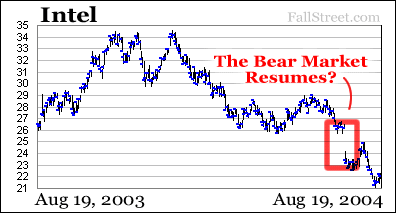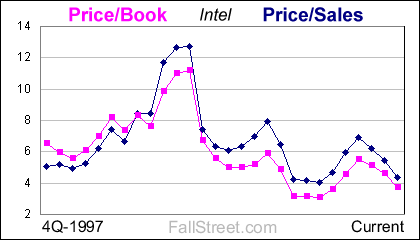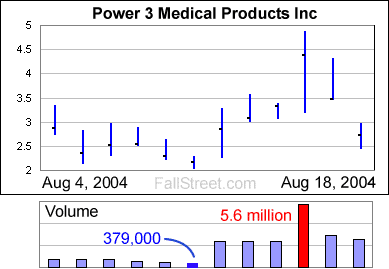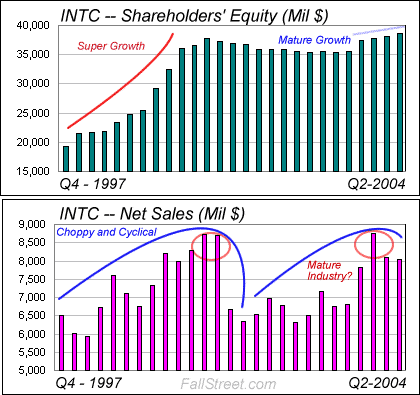August 20, 2004
Intel and Successful Scams Suggest Market Still Frothy
It has been nearly 5-weeks since Intel spooked investors by cutting its gross margin predictions for the second half of 2004. During these 5-weeks oil has set records every day but one; allowing Wall Street to cling to the belief that a relief rally will unfold when oil finally drops.
Before blaming the market’s malaise solely on oil the investor should remember the story of Intel. Also, before speculating that investors are giving up their gambling ways another stock scam is worth noting.
Intel Down But Not Out
Tech bellwether Intel has fallen by 36% since hitting an intraday high of $36.40 on January 9, 2004. Intel shares crashed by 10.5% on July 14, 2004 (after INTC’s 2Q report). Oil, which was trading below $40 a barrel on July 13, has not been the major force behind Intel’s slide.
 |
In fact, what has hurt Intel and an array of other tech stocks most is a jump in inventories over the last two quarters. For example, 5 tech stocks - INTC, IBM, TXN, AMD, and CSCO – have recorded an 18.9% jump in inventories since the end of 2003 (since Oct 25, 03 for Cisco). What this ominous increase in inventories means is that more product has (or is being) produced and is waiting to be sold (these 5 companies alone have added $1.5 billion to inventories since 2003). Needless to say, that the U.S. economy is showing signs of slowing and inventory levels at some key tech companies are rising is not a positive sign. Rather, it suggests that pricing pressures could be ahead.
Despite weakness, Intel shares have not retreated to the valuation levels witnessed in the first quarter of 2003. In other words, Intel shareholders have not capitulated and opened up a trading opportunity in the stock, yet. I note ‘trading opportunity’ because Intel’s low P/B reading in early 2003 was 3.06. Paying 3 times book for a company that doesn’t pay an attractive dividend and doesn’t grow book that quickly anymore may not be that wisest of long-term investment decisions.
 |
Buy! Don’t Ask Why.
The SEC warned yesterday of “a new scam sweeping the country”. However, what the SEC failed to do is list any of the companies that they believe are being ‘pumped and dumped’. If the SEC believes that a company is being illegally touted in phone messages shouldn’t the Commission, at minimum, contact each company and oblige them to issue a statement?
Well, as luck would have it I know of one company that is – in all probability – one of the companies being pumped and dumped. I know about this company because an old friend of mine received a phone message last week that said the stock was getting ready to rally. Since the phone message was made on August 10 the company’s stock price quickly doubled on more than 10 times normal trading volume (although shares have since crashed). The company in question is Power 3 Medical Products Inc (PWRM).
 |
To note: I have no direct evidence that PWRM was, or is a part of a pump and dump scheme. Rather, all I have is one phone message (that has been reported to the SEC) and the suspicious price action soon after this telephone message. The SEC has thousands of messages in its possession and has yet to mention one company that investors should be weary of purchasing.
“We are concerned because the stock prices of companies mentioned in these calls have gone up, presumably as people listen to the messages and buy.” SEC
Conclusions
During the late 1990s one of the best stock scams going was fake internet pages. Fraudsters made up realistic looking web pages (i.e. a fake Yahoo page) and reported false news of takeovers and earnings. Remarkably, many stocks moved following these web publications (the fraudsters front ran the made up news to profits).
Today the phone messages being left across America are moving stocks up and down. The conclusions to be made is that some investors are just as gullible as 1990s investors, and that when investors are looking for quick hit jackpots stocks are not yet in full fledged bear mode.
When a company like Intel is trading at nearly 20 times (non-expensed) earnings and 3+ times book value you can only speculate of a price rise if the bull continues. To be sure, despite what by all accounts is a solid recovery in the company’s financials, Intel is not the growth machine it once was. .
 |
The mainstream press has been telling us that the markets are falling because of oil, Iraq, terrorism, and/or uncertainty surrounding the elections – the set up being that a mother load relief rally lurks sometime between now and the end of the year. No disagreement here.
However, from what leve